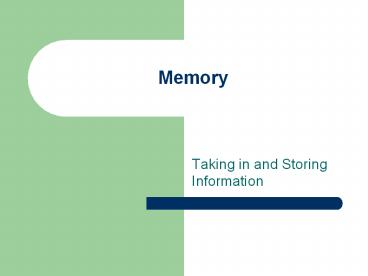Memory - PowerPoint PPT Presentation
1 / 30
Title: Memory
1
Memory
- Taking in and Storing Information
2
What do we remember?
- Write down the very first memory you can think
of! How old were you? - Neural pathways are still developing
- Language barrier
- Survival responses may take precedence
3
Flashbulb Memories
- Surprise-induced memorization
- Empirical research shows that flashbulb memories
may be formed in response to surprising stimuli
and events in general. - Hormonal basis hypothesis
- Cortisol is released in response to stressful
incidents causing the brain to remember things to
avoid in the future. - Reinforcement Theories
4
Informational Processing Model Encoding, Storage
Retrieval
- Sensory Memory very brief memory storage
immediately following initial reception of a
stimulus. - Our senses hold onto memories for fractions of a
second. - Iconic Memory visual sensory memory
- Echoic Memory auditory sensory memory that lasts
for 1-2 seconds
5
Sensory Memory Iconic
- George Sperling Present stimulus for 50ms to
participants - P Y F G
- V J S A
- D H B U
- In one condition he asked for whole (recall was
4) - In another condition, he told them which row of
letters (after they viewed the letters first,
second or third, he would like participants to
try to recall. (recall 3-4 letters) - This meant that for a brief period of time the
grid was available to the participants as sensory
memory. - This suggest we see more than we can say
6
Write down what you read.
7
What did you write down?
- A BIRD IN THE BUSH
- A BIRD IN THE THE BUSH
8
The Processes of MemoryEncoding
- First we encode information.
- Encoding the transforming of information so the
nervous system can process it. - We encode information through our senses.
- Acoustic Codes listening, saying something out
loud - Visual Codes mental pictures, images
- Semantic Codes give meaning to the information
9
Write down the number of Fs Appearing in the
Statement Below.
- Finished files are
- the results of years
- of scientific study
- combined with the
- experience of years.
10
How many did you count? 3, 4, 5, 6 ? (acoustic
or visual encoding?)
- Finished files are
- the results of years
- of scientific study
- combined with the
- experience of years.
11
Instructions will appear on the next slide.
- Nod your head when you fully understand the
instructions.
12
Group 1
- FOR EACH OF THE WORDS THAT I AM GOING TO READ,
MENTALLY RATE THE USEFULNESS OF THE ITEM, ON A
1-5 SCALE, IF YOU WERE STRANDED ON A DESERT
ISLAND.
13
Instructions will appear on the next slide.
- Nod your head when you fully understand the
instructions.
14
GROUP 2
- FOR EACH OF THE WORDS THAT I AM GOING TO READ,
MENTALLY ESTIMATE THE NUMBER OF SYLLABALS FOUND
IN THE WORD.
15
The Processes of Memory
- Storage
- Storage The process by which information is
maintained over a period of time. - How much effort was put into encoding?
16
Three Stages of Memory Short-Term
- Short-Term Memory memory that is limited in
capacity to about seven items and in duration by
the subjects active rehearsal. - Information needs to be repeated to keep in short
term memory.
17
Short-Term Memory
- Maintenance rehearsal shallow processing
- 20 seconds
- Rule of 7 (7 /- 2)
- Try to remember as many of the following letters
as possible.
FABCPBSNBCCNNMTV F ABC PBS NBC CNN MTV Chunking
the process of grouping items to make them easier
to remember. Social Security Numbers Phone
Numbers
18
Lets Test Your Short Term Memory!
- 925
- 8642
- 37654
- 627418
- 0401473
- 19223530
- 486854332
- 7290035673
- 61531797264
19
Put Your Pens/Pencils Down and Listen to the List
of Words I Read.
- 5 10 15 20
- Dream
- Night
- Toss
- Turn
- Sound
- Rest
- Snore
- Awake
- Night
- Slumber
- Eat
- Artichoke
- Comfort
- Wake
- Tired
- Clock
- Fatigue
- Silence
20
Short-Term Memory
- The Serial Position Effect we are better able to
recall information presented at the beginning and
end of a list. - Primacy Effect
- Recency Effect
21
Informational Processing Model Encoding, Storage
Retrieval
22
Try to remember everything you see and hear.
23
The Processes of Memory
- Retrieval
- Retrieval The process of obtaining information
that has been stored in memory. - Information is brought back to mind from storage.
- Depends on how information was encoded and stored.
24
Deliberate Explicit Conscious Recall
No conscious recall C.C. habits
Memory of events in serial form
25
Long-Term Memory Semantic Memory
- Semantic Memory knowledge of language, including
its rules, words, and meanings.
26
Long-Term Memory Episodic Memory
- Episodic Memory memory of ones life, including
time of occurrence.
27
Long-Term Memory Procedural Memory
- Procedural Memory memory of learned skills that
does not require conscious recollection. - Skills
- Habits
- Classical Conditioning
28
Long-Term Memory Declarative Memory
- Declarative Memory memory of knowledge that can
be called forth consciously as needed. - Explicit Memory
- deliberate effortful
- Implicit Memory
- automatic
29
Encoding, Storage, Retrieval
30
Three Stages of Memory Long-Term Memory
- Long-Term Memory information is stored for long
periods of time.































